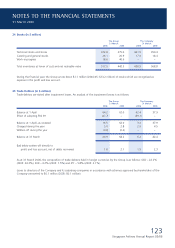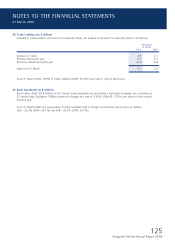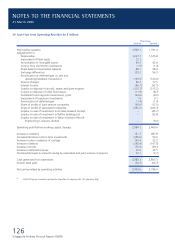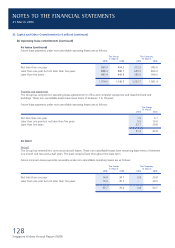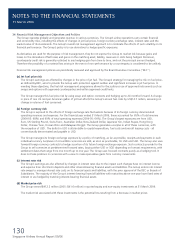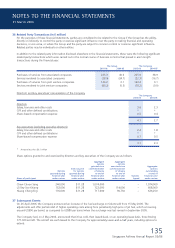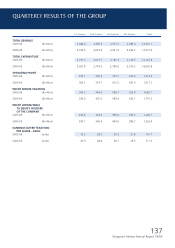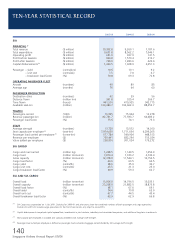Singapore Airlines 2006 Annual Report Download - page 132
Download and view the complete annual report
Please find page 132 of the 2006 Singapore Airlines annual report below. You can navigate through the pages in the report by either clicking on the pages listed below, or by using the keyword search tool below to find specific information within the annual report.
130
Singapore Airlines Annual Report 05/06
34 Financial Risk Management Objectives and Policies
The Group operates globally and generates revenue in various currencies. The Group’s airline operations carry certain fi nancial
and commodity risks, including the effects of changes in jet fuel prices, foreign currency exchange rates, interest rates and the
market value of its investments. The Group’s overall risk management approach is to moderate the effects of such volatility on its
fi nancial performance. The Group’s policy is to use derivatives to hedge specifi c exposures.
As derivatives are used for the purpose of risk management, they do not expose the Group to market risk because gains and
losses on the derivatives offset losses and gains on the matching asset, liability, revenues or costs being hedged. Moreover,
counterparty credit risk is generally restricted to any hedging gain from time to time, and not the principal amount hedged.
Therefore the possibility of a material loss arising in the event of non-performance by a counterparty is considered to be unlikely.
Financial risk management policies are periodically reviewed and approved by the Board Executive Committee (“BEC”).
(a) Jet fuel price risk
The Group’s earnings are affected by changes in the price of jet fuel. The Group’s strategy for managing the risk on fuel price,
as defi ned by BEC, aims to provide the Group with protection against sudden and signifi cant increases in jet fuel prices. In
meeting these objectives, the fuel risk management programme allows for the judicious use of approved instruments such as
swaps and options with approved counterparties and within approved credit limits.
The Group manages this fuel price risk by using swap and option contracts and hedging up to 24 months forward. A change
in price of one US cent per American gallon of jet fuel affects the Group’s annual fuel costs by US$14.7 million, assuming no
change in volume of fuel consumed.
(b) Foreign currency risk
The Group is exposed to the effects of foreign exchange rate fl uctuations because of its foreign currency denominated
operating revenues and expenses. For the fi nancial year ended 31 March 2006, these accounted for 65% of total revenue
(2004-05: 68%) and 69% of total operating expenses (2004-05: 64%). The Group’s largest exposures are from USD,
Euro, UK Sterling Pound, Swiss Franc, Australian Dollar, New Zealand Dollar, Japanese Yen, Indian Rupee, Hong Kong
Dollar, Chinese Yuan, Korean Won and Malaysian Ringgit. The Group generates a surplus in all of these currencies, with
the exception of USD. The defi cit in USD is attributable to capital expenditure, fuel costs and aircraft leasing costs - all
conventionally denominated and payable in USD.
The Group manages its foreign exchange exposure by a policy of matching, as far as possible, receipts and payments in each
individual currency. Surpluses of convertible currencies are sold, as soon as practicable, for USD and SGD. The Group also uses
forward foreign currency contracts to hedge a portion of its future foreign exchange exposure. Such contracts provide for the
Group to sell currencies at predetermined forward rates, buying either USD or SGD depending on forecast requirements, with
settlement dates that range from one month up to one year. The Group uses forward contracts purely as a hedging tool. It
does not take positions in currencies with a view to make speculative gains from currency movements.
(c) Interest rate risk
The Group’s earnings are also affected by changes in interest rates due to the impact such changes have on interest income
and expense from short-term deposits and other interest-bearing fi nancial assets and liabilities. The Group enters into interest
rate swaps to manage interest rate costs on its fi nancial assets and liabilities, with the prior approval of the BEC or Boards of
Subsidiaries. The majority of the Group’s interest-bearing fi nancial liabilities with maturities above one year have fi xed rates of
interest or are hedged by matching interest-bearing fi nancial assets.
(d) Market price risk
The Group owned $412.2 million (2005: $41.6 million) in quoted equity and non-equity investments at 31 March 2006.
The market risk associated with these investments is the potential loss resulting from a decrease in market prices.
NOTES TO THE FINANCIAL STATEMENTS
31 March 2006





